Key takeaways:
- The evaluation of a book involves key criteria: character development, plot pacing, emotional impact, and writing style.
- Personal rating systems can enhance the reading experience by quantifying criteria like character relatability and emotional resonance.
- Revisiting and recapping ratings can lead to new insights, highlighting how emotions and personal growth influence literary appreciation over time.
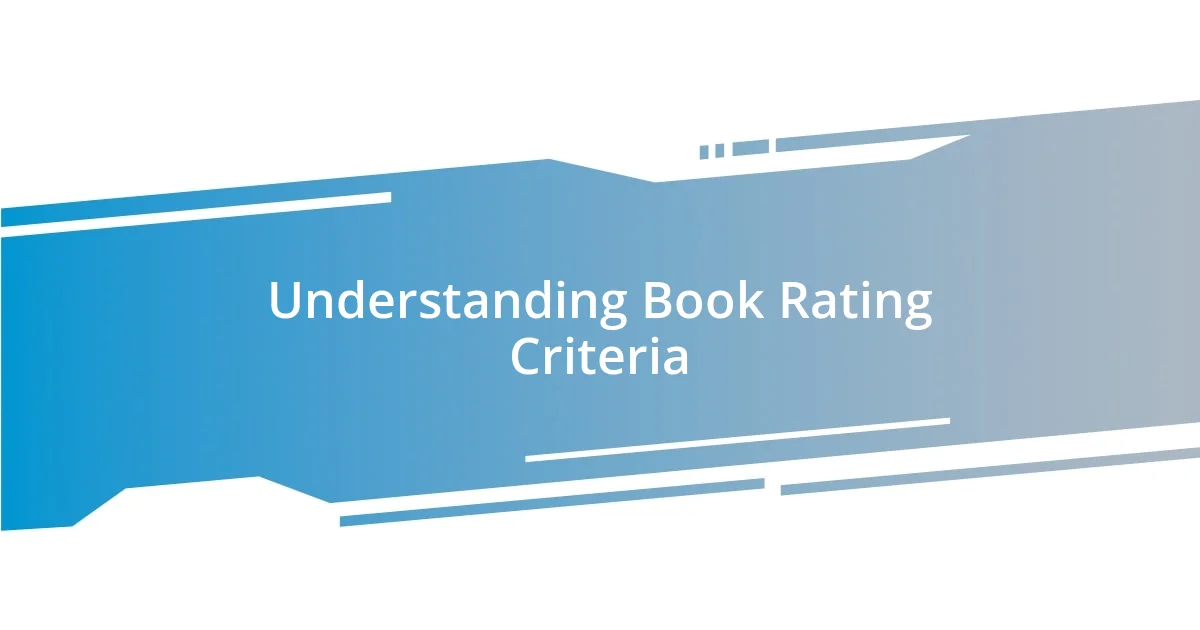
Understanding Book Rating Criteria
When I evaluate a book, I often start by considering its character development. Did the characters feel real to me? In one memorable read, I found myself deeply invested in the protagonist’s journey, which made the story unforgettable. The emotional depth and growth of the characters can truly elevate a book in my mind.
Plot pacing also plays a critical role in my ratings. I remember struggling through a novel where the plot dragged in the middle, leaving me wondering if it would ever pick up. This experience taught me the importance of keeping the reader engaged; a well-paced story keeps me turning the pages.
Lastly, I think about writing style and voice. There’s something magical about the way certain authors weave words together; it can evoke emotions I didn’t even know I had. Have you ever closed a book feeling like you’ve just experienced a new world? For me, that’s when a book really earns its place on my shelf.
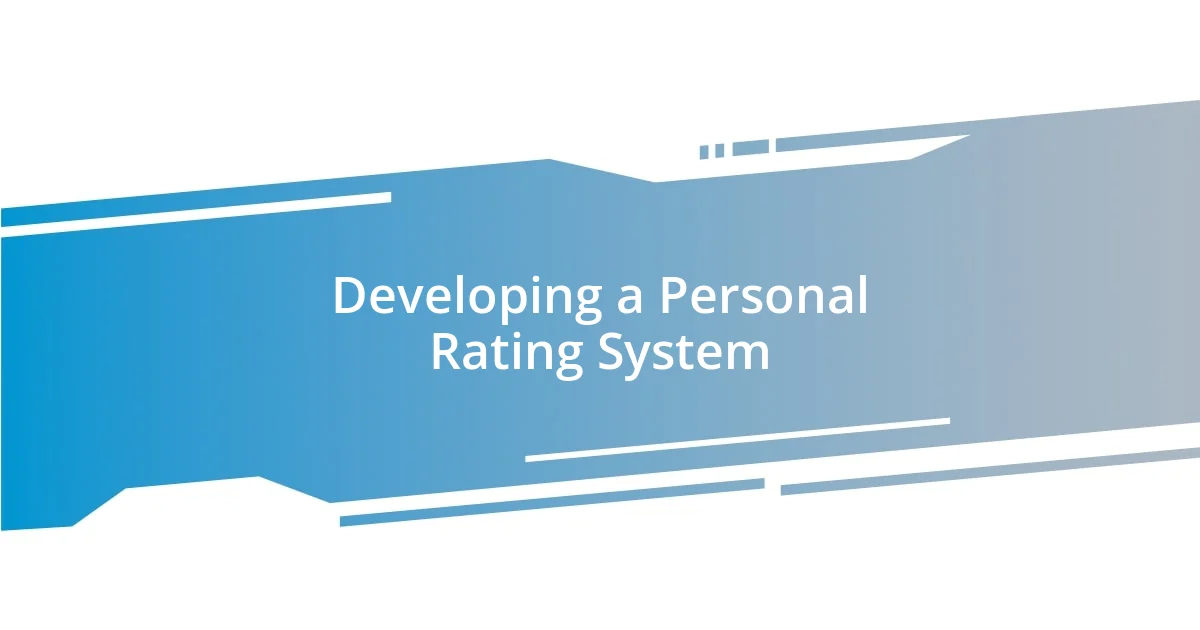
Developing a Personal Rating System
When developing my personal rating system, I find it helpful to start by assigning numerical values to specific criteria. For example, I might rate character development from 1 to 5, based on how relatable and complex the characters are. I remember reading a fantasy novel where the protagonist felt like a friend by the end, and I rated it a solid 5 simply for that connection.
I also consider the emotional impact of the book. Was I left with a sense of fulfillment or perhaps heartbreak? I once finished a memoir that left me in tears, reflecting on my own life choices. That emotional resonance pushed my rating for that book to the top of my scale. It made me realize that a book doesn’t just have to have a compelling plot; it should also make us feel something deep inside.
Lastly, I incorporate overall engagement as a separate category. I often ask myself, “Did I want to put the book down?” Recently, I tackled a thriller that had me on the edge of my seat. I couldn’t sleep until I finished it, and that drove my rating up considerably. Crafting a personal rating system might take some trial and error, but it ultimately helps me capture my reading experiences more accurately.
| Criteria | Rating Scale (1-5) |
|---|---|
| Character Development | 1 – Lack of depth, 5 – Extremely relatable |
| Emotional Impact | 1 – Not impactful, 5 – Profoundly moving |
| Engagement | 1 – Difficult to read, 5 – Couldn’t put it down |
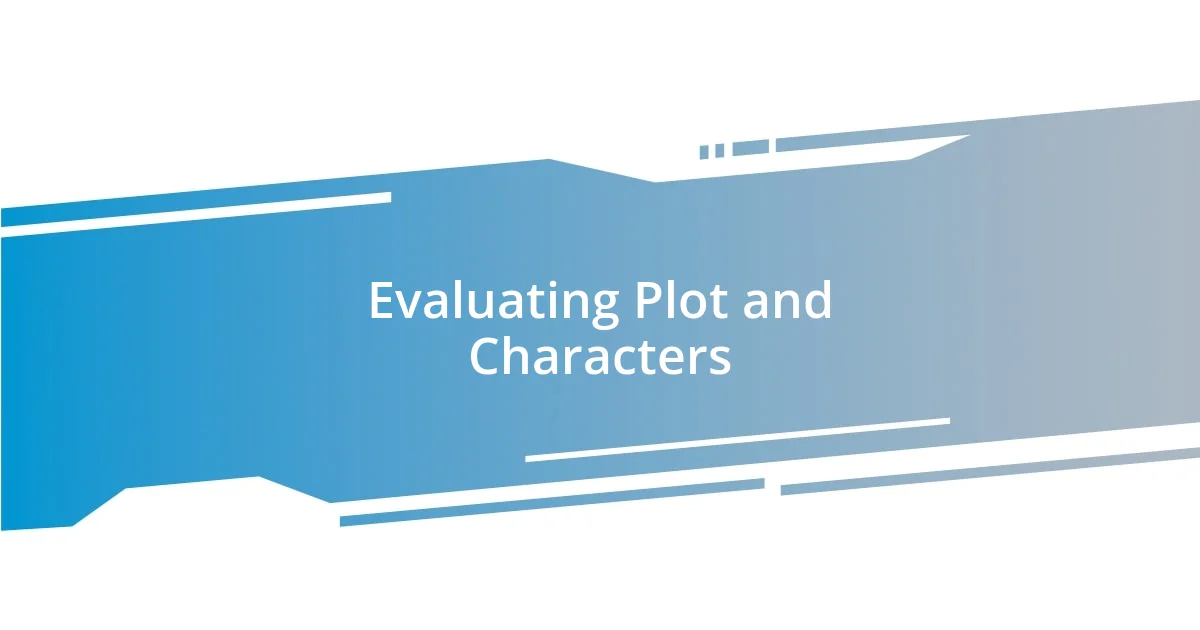
Evaluating Plot and Characters
When I dive into evaluating a book, the plot’s twists and turns significantly impact my rating. There’s nothing quite like the thrill of a surprising plot twist that leaves me gasping. I recall reading a mystery where I thought I had it all figured out, only to be blindsided by a twist in the last chapter. That mastery over plot development deserves major kudos in my book!
- A captivating plot keeps me eager to know what happens next.
- I appreciate stories with layers; complex plots engage my curiosity.
- I consider the believability of the storyline; did everything come together in a satisfying way?
Character depth shapes my experience just as much. If I see a part of myself in a character, it elevates the reading experience. I once came across a novel where the main character faced their anxiety head-on, and I felt an immediate connection. That character’s journey mirrored my struggles, making it an emotional ride that lingered with me long after the last page.
- Relatable characters provide an emotional anchor for the story.
- I look for growth; characters transforming through challenges resonate with me.
- If the characters feel flat or stereotypical, it detracts from my overall enjoyment.
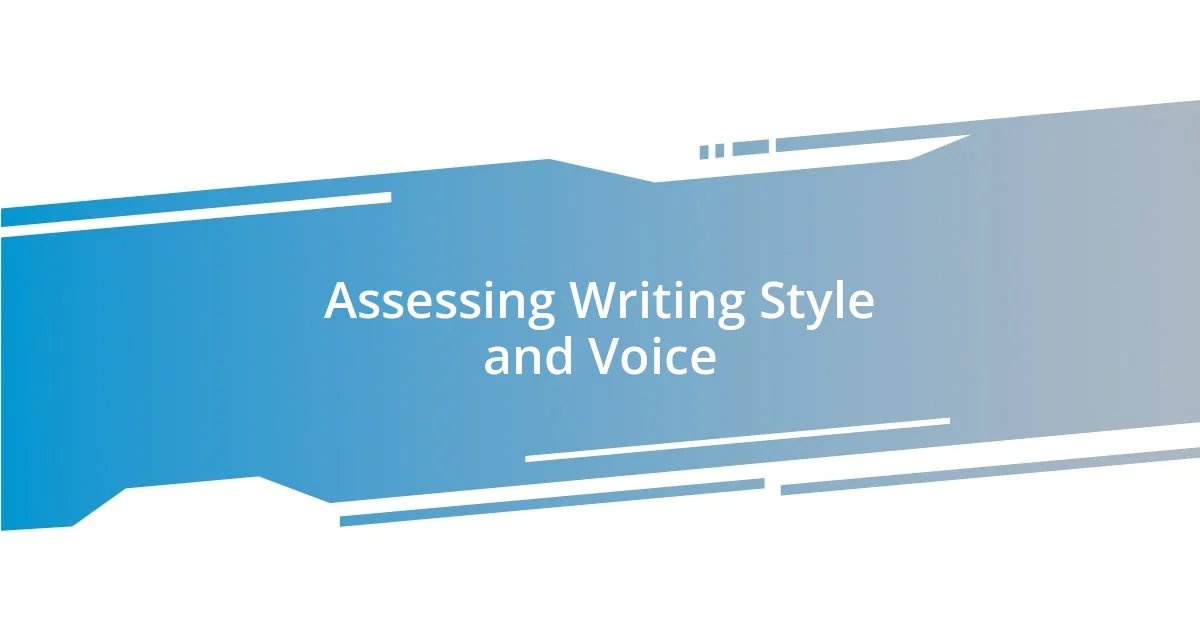
Assessing Writing Style and Voice
When it comes to assessing writing style and voice, I find that each author brings a unique flavor that can either draw me in or push me away. I remember picking up a literary fiction novel that boasted exquisite prose, and I was immediately captivated by the author’s lyrical style. It felt like I was reading poetry woven into a narrative. It’s fascinating how some writers can evoke such vivid imagery that I can almost see the scenes unfold before my eyes, while others might struggle to hold my attention.
I also pay close attention to the narrative voice. Does it feel authentic and engaging? For instance, I recently read a young adult novel narrated by a teenager, and I really appreciated how the voice felt true to life—full of wit and exuberance. That relatability made me chuckle and reminisce about my own youthful adventures. Conversely, when the voice feels forced or disconnected, I tend to struggle to forge that crucial emotional bond.
Another layer to consider is the dialogue. I can’t tell you how often I’ve cringed at awkward conversations in a book. One time, I encountered a dystopian novel where the characters had an unnatural way of speaking, which disrupted my immersion. Dialogue should not only sound realistic but also drive character development. Does it reveal their emotions, motivations, and relationships? When I find dialogue that resonates with me, it enriches the reading experience, making me feel as if I’m part of the story.
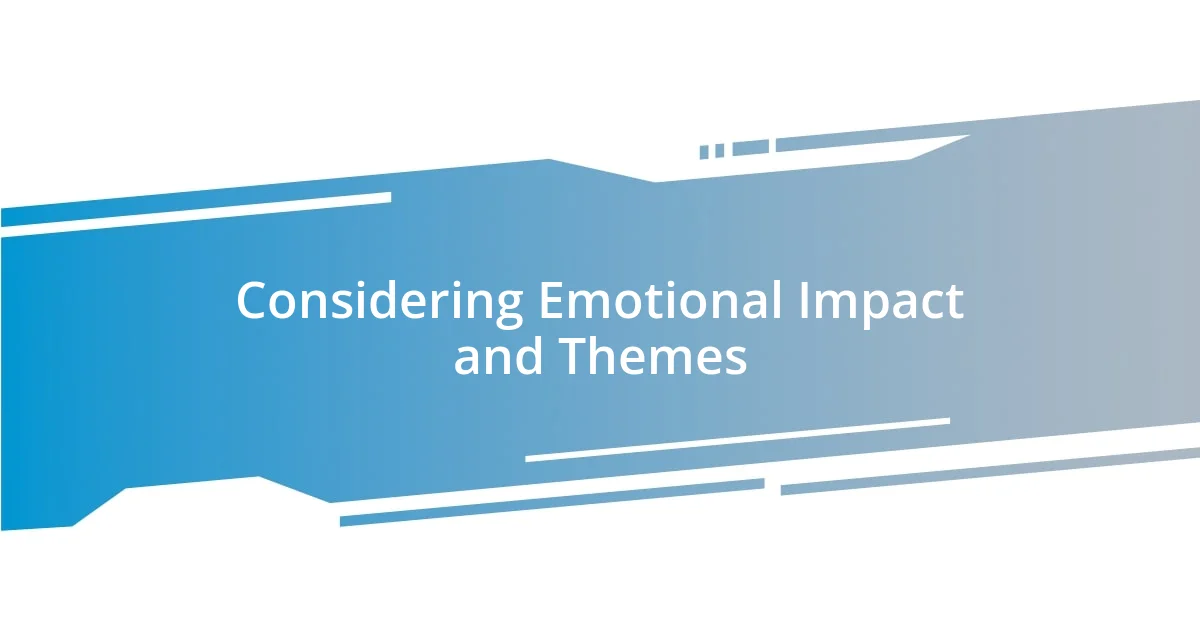
Considering Emotional Impact and Themes
When I reflect on emotional impact and themes in a book, I often find myself moved by how a story can shape my feelings. Take, for example, a book I recently read about loss and resilience. The theme of overcoming grief was so palpable that I found myself in tears more than once. This deep emotional connection not only enhanced my reading experience but also left me pondering my own life’s challenges. How does a book’s emotional weight affect your memory of it?
Themes also provide a lens through which I view the world. I vividly recall reading a novel that explored the intricacies of friendship and betrayal. It made me reevaluate my own relationships and the sometimes painful choices we face. The best books are those where the themes resonate on a personal level, prompting me to reflect on my own beliefs and experiences. For me, that’s where the magic lies.
Moreover, I’m drawn to books that tackle hard-hitting societal issues. I once stumbled upon a narrative that addressed mental health with such sensitivity and authenticity that it felt like a conversation with a trusted friend. The author’s compassionate portrayal not only educated me but also validated my own struggles. It’s rewarding when a book not only entertains but also enlightens, opening up dialogues that we desperately need in our communities. How could I rate a book poorly if it sparks such essential conversations?
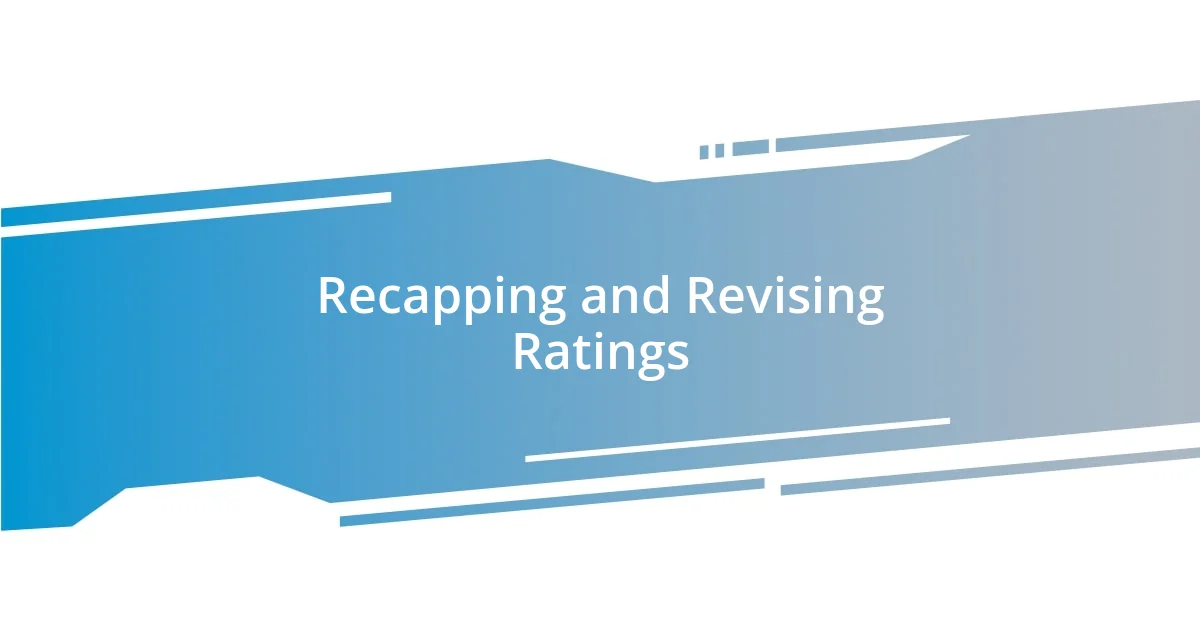
Recapping and Revising Ratings
Recapping my ratings often feels like rediscovering a favored song. Some books resonate with me years later, while others fade into the background. Recently, I revisited a fantasy novel I once adored, and I was surprised to find that a few elements that delighted me originally now felt contrived. This experience led me to reassess how I engage with different genres over time. Could it be that my evolving tastes shape my ratings just as much as the story itself?
As I revise my ratings, I consider the emotional impact a book left on me. There was a thriller that initially captivated me with its twists, leading me to give it four stars. However, upon reflection, I realized that the lack of character depth left me feeling detached. Revisiting that book, I wondered if my emotional connection—or lack thereof—should weigh more heavily in my rating. How can I truly say a book is exceptional if I didn’t connect with its characters?
It’s intriguing how recapping ratings can spark new insights. Just the other day, I found myself analyzing a memoir that initially struck me as dull. But after taking a step back and considering its themes of growth and vulnerability, I felt inspired to upgrade my rating. This shift in perspective reminded me that sometimes a book’s true value only reveals itself after consideration. Isn’t it fascinating how our thoughts can evolve along with our experiences?














